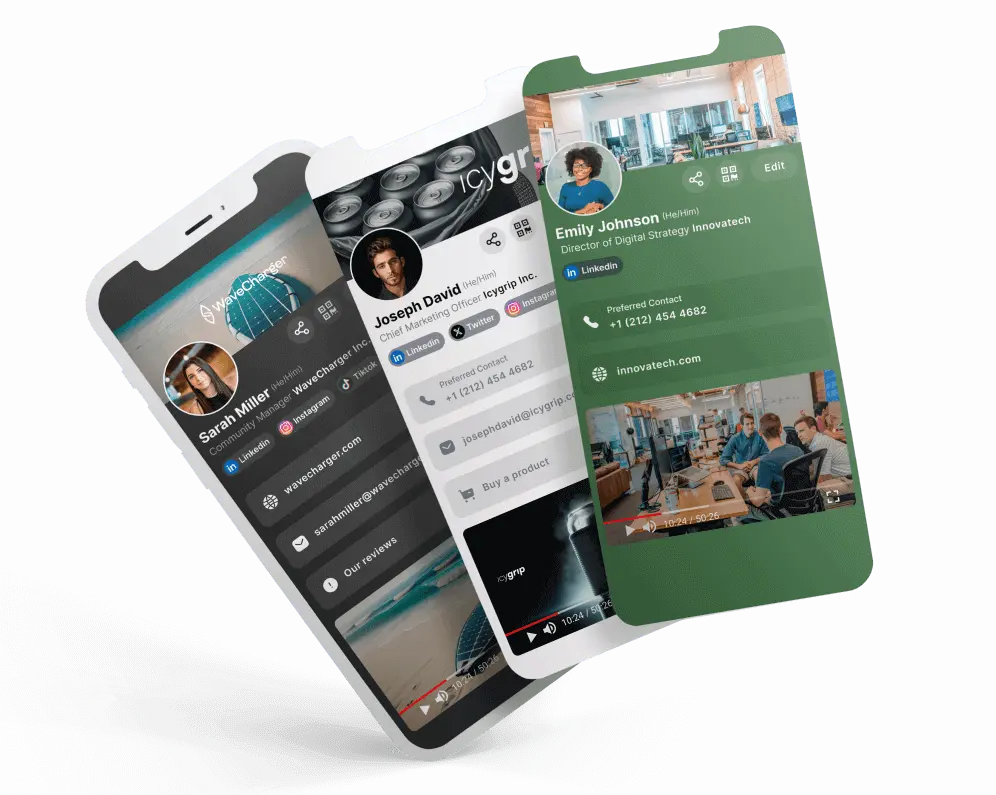 Go back to list of posts
Go back to list of postsChoose the Best Business Card: KADO vs. Vistaprint
September 29, 2024
Making a lasting impression while networking is crucial. While traditional paper business cards have their place, the rise of digital alternatives offers a modern, versatile approach to sharing contact information. Two notable contenders in the business card space are KADO and Vistaprint. This blog will help you compare these services to find the best fit for your business networking needs.
The Basics
KADO:
KADO is a leading digital business card platform that allows users to create, customize, and share their business cards effortlessly. KADO offers various sharing methods, including NFC technology, QR codes, and web-based cards, ensuring easy access for potential contacts. With a focus on modern design and functionality, KADO enhances the way you network.
Vistaprint:
Vistaprint is a well-known name in the printing industry, recognized for its wide range of customizable products, including traditional paper business cards. Vistaprint has expanded its offerings to include VistaConnect, which provides NFC-enabled cards that bridge the gap between physical and digital formats. However, its primary strength remains in traditional printing services.
Sharing and Accessibility
KADO:
With KADO, sharing your business card is seamless. You can share your card instantly via text, email, or QR code, making it easy for potential clients or contacts to save your information. KADO’s NFC cards add an extra layer of convenience, allowing users to simply tap their card to another device for immediate sharing. Plus, KADO’s cards are accessible from any device, ensuring you never miss a connection, whether in-person or online.
Vistaprint:
Vistaprint’s VistaConnect allows you to integrate NFC technology into traditional cards, enabling users to tap and share their details digitally. However, this approach still relies on the physical Vistaprint business card being present, which can be a limitation compared to KADO's fully digital experience.
CRM Integration
KADO:
KADO offers robust CRM integration capabilities, allowing users to seamlessly connect their digital business cards with various CRM platforms. This feature automates lead capture and contact management, simplifying the follow-up process and enhancing networking efficiency.
Vistaprint:
While Vistaprint’s VistaConnect offers some digital capabilities, it lacks the extensive CRM integration features that KADO provides. This could be a significant drawback for professionals relying heavily on CRM systems to manage their networking efforts.

Customization and Design Options
KADO:
KADO digital business cards provides a robust platform for creating visually appealing digital business cards tailored to your branding. Users can choose from various templates, colors, and fonts, allowing for a personalized touch that reflects their professional identity. The digital nature of KADO also means you can easily update your design without the need for reprints.

Vistaprint:
Vistaprint business card offers a wide range of templates for traditional business cards. While you can customize these templates to some extent, the design process is more limited when compared to KADO’s digital flexibility. Additionally, once printed, any changes to your Vistaprint card would require reordering, which can be cumbersome.
Environmental Considerations
KADO:
KADO is committed to sustainability, offering digital business cards that significantly reduce paper waste. By choosing KADO, you contribute to eco-friendly practices while embracing modern technology.
Vistaprint:
Vistaprint business card has made strides in offering eco-friendly products, but their core business still revolves around printing physical cards. Transitioning to digital solutions can be a slower process within their framework, making KADO a more sustainable choice.
Both KADO and Vistaprint offer unique approaches to business cards, each catering to different needs and preferences. If you're looking for a flexible, modern solution that emphasizes digital sharing, customization, and CRM integration, KADO is the clear choice.
On the other hand, if you prefer traditional printed cards with some digital enhancements, Vistaprint may meet your requirements. Ultimately, the right choice will depend on your networking goals, the importance of sustainability to you, and whether you prioritize digital or physical solutions in your professional life. Choose wisely, as the right business card can significantly impact your networking success.
In summary, when it comes to choosing between KADO and Vistaprint, consider the following aspects:
- Customization: KADO offers superior customization options compared to Vistaprint.
- Digital Versatility: KADO allows for seamless digital sharing, while Vistaprint is more focused on physical products.
- Environmental Impact: KADO is more sustainable, while Vistaprint still relies heavily on traditional printing.
- CRM Integration: KADO provides robust integration with CRM systems, which is a vital feature for many professionals.
In the end, the choice between KADO digital business cards and Vistaprint comes down to your specific needs and preferences. If you want to embrace modern technology and sustainable practices, KADO is the way to go. However, if you're more comfortable with traditional methods and simply want to enhance your physical cards, Vistaprint might be your best bet.
Check out Digital business cards comparisons below:
Popl vs Linq



